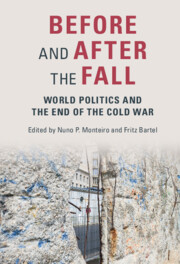Book contents
- Before and After the Fall
- Before and After the Fall
- Copyright page
- Dedication
- Epigraph
- Contents
- Figures
- Tables
- Contributors
- Preface
- Introduction
- Part I Sources of Continuity and Change
- Part II Continuity and Change Across the 1989/1991 Divide
- 6 The Nuclear Age
- 7 Legitimating Primacy After the Cold War
- 8 Russia’s Rejection of Liberal Politics
- 9 Continuity and Change in Russian Grand Strategy
- 10 The Stickiness of Strategy
- 11 Avoiding the Limelight
- Part III Toward a New World Order?
- Index
7 - Legitimating Primacy After the Cold War
How Liberal Talk Matters to US Foreign Policy
from Part II - Continuity and Change Across the 1989/1991 Divide
Published online by Cambridge University Press: 02 December 2021
- Before and After the Fall
- Before and After the Fall
- Copyright page
- Dedication
- Epigraph
- Contents
- Figures
- Tables
- Contributors
- Preface
- Introduction
- Part I Sources of Continuity and Change
- Part II Continuity and Change Across the 1989/1991 Divide
- 6 The Nuclear Age
- 7 Legitimating Primacy After the Cold War
- 8 Russia’s Rejection of Liberal Politics
- 9 Continuity and Change in Russian Grand Strategy
- 10 The Stickiness of Strategy
- 11 Avoiding the Limelight
- Part III Toward a New World Order?
- Index
Summary
At the end of the Cold War, the United States came to pursue a policy of “liberal primacy” that would maintain America’s hegemonic status while expanding the liberal institutions that constituted the postwar international order. At least three important, long-standing questions persist about liberal primacy. First, was liberal primacy consistent with, or a radical departure from, US strategy during the Cold War? Second, how did the United States come to embrace primacy as a central objective of its foreign policy in the post-Cold War period? Finally, why did the United States choose specific strategies of expansion, especially its decision to enlarge NATO, rather than pursue other options like Partnership for Peace? We suggest that focusing on the legitimation of US foreign policy can shed light on these questions. Over the decades, US leaders have consistently invoked familiar liberal concepts and tropes to justify US foreign policy. From a legitimation perspective, there is much more continuity than change between Cold War and post-Cold War US foreign policy. We argue liberal legitimation made the post-Cold War strategy of primacy palatable both at home and abroad. Finally, liberal legitimating language bolstered the proponents of NATO expansion, clearing the path for expansionist policies.
- Type
- Chapter
- Information
- Before and After the FallWorld Politics and the End of the Cold War, pp. 132 - 150Publisher: Cambridge University PressPrint publication year: 2021



